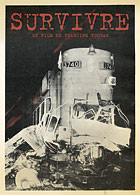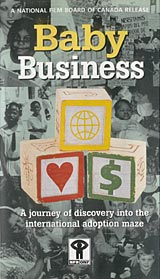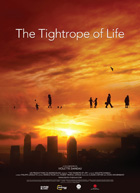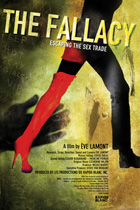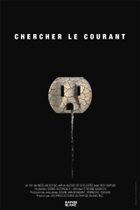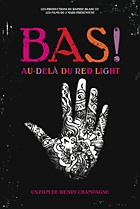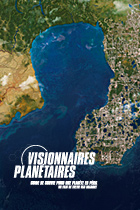|
|
 FRANÇAIS FRANÇAIS |
 |
|
|

|
 |
|

Films
|
|
| |

The Tightrope of Life
Documentary by Violette Daneau
Produced by Claude Cartier and Sylvie Van Brabant
2010, 92 minutes
French, Spanish & English Subtitles
A road movie for the soul, The Tightrope of Life, is a documentary feature film that stems from the childhood prayers of the director who, at age seven, asks God to “let me live till I’m 20.” Now 59, Violette Daneau explores mortality through a series of encounters with people confronted by death either through their professional activities or their state of health. She also delves into traditions and rituals surrounding this ultimate taboo. Surprisingly, her quest puts her whole life into perspective.
Filmed in Quebec, Switzerland, Spain and the United States, this personal journey is a dynamic, courageous and sometimes troubling trek through the human cycle: from birth, to life, to death.

|
| |
|
|
| |

The Fallacy
Documentary by Ève Lamont
Produced by Nicole Hubert
2010, 93 minutes
French, English Subtitles
The current trend to label prostitution a profession “like any other” has met with opposition from women who have actually been involved in the sex trade. With clarity and courage, they reveal the hidden side of so-called “sex work,” which is never an informed choice leading to wealth, pleasure and freedom.
The women are 22, 34 and 48 years old and live in Montreal, Quebec City and Ottawa. They have recently given up prostitution or are trying to escape it. They put up a fierce fight to turn their lives around and reintegrate into society. This documentary shot in cinéma vérité style is a candid look at a prostitute’s reality.
In a long journey fraught with hurdles, each women seeks to gain control over her life, rebuild her self-esteem and find true happiness. Given the few resources available, a researcher and anthropologist sets up an independent centre to support these women in their struggles.
Official Competition Rencontres internationales du documentaire de Montréal 2010.

• Official competition Rencontres internationales
• du documentaire de Montréal (RIDM) 2010

|
| |
|
|
| |

Chercher le courant
Documentary by Nicolas Boisclair and Alexis de Gheldere
Produced by Denis McCready and Nicolas Boisclair
2010, 85 minutes
French, English & English Subtitles
English synopsis coming soon.

• Winner of the Audience Award offered by Canal D, Rencontres
• internationales du documentaire de Montréal (RIDM) 2010
- Special Mention by ÉcoCaméra's jury members,Rencontres
• internationales du documentaire de Montréal (RIDM) 2010
 |
| |
|
|
| |

BAS!
Beyond the Red Light
Documentary by Wendy Champagne
Produced by Denis McCready and Wendy Champagne
2009, 77 minutes
Hindi, Nepali, English
& English Subtitles
How can you create a future from a past that dares not be told? In BAS! Beyond the Red Light 13 young girls sold into Mumbai’s infamous network of gated brothels confront the inner and outer perils of life after rescue and reveal the very human story inside the big business of child trafficking.
As wards of the court these young victims from remote corners of the Indian subcontinent are flung together and held virtual prisoners in a four-story suburban shelter in Mumbai until they come of age. Here they confront not only the pain of their recent past but also the stark choices in their futures: a fifty-fifty chance of being re-trafficked, marriage arranged through the Foundation with men twice their age or domestic servitude.
The film explores this lesser known issue of rehabilitation and reintegration of child victims from these girls point of view. We move between gated brothels and guarded dormitories to a rehearsal studio where the girls practice bhangra dance moves learned from lazy afternoons in front of the communal TV and rehearsed in regular dance therapy classes, to tell their stories to the rest of the world.
Through intimate, sustained access to these former victims and to Mumbai’s underworld, BAS! Beyond the Red Light interweaves dance rehearsals and candid observations from the girls themselves with testimony from a trafficker, a local Red Light politician and workers at the Rescue Foundation.
Shot over the course of three and a half years and beautifully photographed by cinematographer Katerine Giguère, the film captures the extraordinary beauty and truth of the girls and juxtaposes this against the volatile and visually provocative backdrop of the largest Red Light area on the planet.
Bas! means : enough!
For more info on the film and it's mission :
bas-doc

• NFB Colin Low Award for most innovative Canadian
• Documentary, Doxa Festival, Vancouver
• Best Documentary, L.A. Femme International Film Festival

|
| |
|
|
| |

Earth Keepers
A Survival Guide for a Planet in Peril
(Visionnaires planétaires)
Documentary by Sylvie Van Brabant
Produced by Sylvie Van Brabant, Marie-France Côté,
Lucille Veilleux, Peter Wintonick (Rapide-Blanc)
and Yves Bisaillon, Patricia Bergeron
(National Film Board of Canada)
2009, 82 minutes
English Naration & Subtitles
This documentary traces the quest of Mikael Rioux, a young activist from Trois-Pistoles, Quebec. Eighty-year-old Christian de Laet, a pioneering Canadian environmentalist, Rioux's guide and mentor, urges him to go and meet visionary men and women implementing innovative projects for the future of society.
In Earth Keepers, we meet India’s Ashok Khosla, head of Development Alternatives, which is putting development back in the hands of local populations. He believes that if politicians show true willingness, world poverty could be eliminated within five years. We also meet Canadian eco-designer John Todd and his “living machines,” which mimic the cycles of nature for waste-water reclamation; Todd states that we have the ability to reduce our impact on the environment by 90 percent immediately. We encounter Sweden’s Karl-Henrich Robèrt, developer of
the Natural Step method for managing municipalities and large corporations, based on a creative vision of the future. He believes that this scientific method is the basis for true sustainable development. Lastly, we meet Kenya’s Wangari Maathai, founder of the Green Belt Movement, which has seen millions of trees planted by women who are taking the future of their country into their own hands. This grande dame, winner of the 2004 Nobel Peace Prize, is proof that perseverance and passion can
turn a grassroots initiative into salvation for an entire people – and even, she believes, the planet itself.
After meeting these realist visionaries, Mikael returns home pumped up, confident and driven by a sense of urgency. Therein lies the great strength of this documentary: This young man’s inquiry becomes our own, and a vibrant plea to end our lethargic ways.
Earth Keepers, with its eloquent imagery, evocative soundtrack and dynamic editing, conveys clear-minded hope and is a remarkable, inspiring survival guide for all those who refuse to give up, despite the enormity of the challenges we may face.
More on nfb.ca/earthkeepers

• Best Canadian Long Form Film, Planet in Focus 2009
• Official Competition, features IDFA 2009
• Audience Award, Festival de Films de Portneuf
• sur l’environnement 2010
• Finalist in Best documentary about Science and Nature category,
• Gémeaux gala 2010
• Environmental Award, Reykjavik International Film Festival (RIFF)
 |
| |
|
|
| |

019
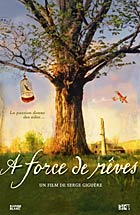
E IN FRENCH |

Driven by Dreams
(À force de rêves )
Documentary by Serge Giguère
Produced by Nicole Hubert (Rapide-Blanc)
and Colette Loumède (National Film Board of Canada)
Executive producer: Sylvie Van Brabant
2006, 83 minutes
English Subtitles
What do musician Reine Décarie, painter Ray Monde, antique dealer Jean Lacasse, logger Gérard Allaire, miniature model airplane pilot Marc-André Péloquin and members of the Big Band du lundi soir all have in common? All are seniors between the ages of 73 and 92. In their twilight years they all cultivate a passion, an occupation in which they invest themselves totally, with an energy that is catching. These folks, none of whom knows the other, contribute to create a fragmented mosaic of segments, filmed over a long period of time by filmmaker Serge Giguère, who loves to hang out with life’s humble but fascinating handymen.
Shot in a direct, informal style, Driven by Dreams attempts to link these separate human destinies together, assembling them by focussing on corresponding, complementary elements in their lives. Thanks to the vision of the image-maker, these diverse poetic, personal universes come together to mutually enrich each other, even though the individuals never meet face-to-face. The passage of time, each character’s anonymous life story and specific environment, and particularly, the attention given to each individual’s personal rhythm serve to highlight the existence of universal values that make these individuals truly a part of History.

• Prix Jutra, Best Documentary, Montreal, Canada, 2007
• NFB Prize for Best Canadian Documentary,
• Calgary International Film Festival, 2007
• La Vague Prize for Best Documentary, International Francophone
• Film Festival in Acadie, Moncton, Canada, 2007
• Special Jury Prize Canadian Feature Documentary, Hot Docs,
• Toronto, Canada, 2007
 |
| |
|
|
|
| |
E IN FRENCH |

Survivors
(Survivre)
Documentary by Francine Tougas
Produced by Sylvie Van Brabant
2006, 52 minutes
English Subtitles
In Dorion, a small town west of Montreal forty adolescents between the ages of 14 and 16 board a school bus. They will get only as far as the level train crossing on this October evening. Their bus is crushed by the impact and momentum of a train rolling at full speed. Twenty are killed, including the driver. It is a tragedy that makes headlines the world over. October 7, 1966, is a day burnt into the memory of a town. For the survivors, the witnesses, relatives and friends things will never be the same.
I am one of them, and even now, 40 years later I still find that I have no desire to forget the night that brought me face to face with the brutal horror that life can bear. I want to know how my friends, the survivors of this accident coped with this tragedy over the course of their lives, knowing that they had lived while their friends, brothers and sisters were dead.
At my age it is common for one to reach back into the dreams of youth and conjure a smile and a bit of strength to carry on. But how can you do that when your past has been shaken by such an event? That is what I wish to find out, with the hope that perhaps the answers will bring solace and peace of mind to myself and my fellow survivors.

• Best documentary point of view, Golden Sheaf Awards,
• Yorkton Film Festival, 2007

|
| |
|
|
|
| |


017
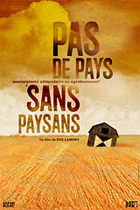
|

The Fight for True Farming
(Pas de pays sans paysans)

Documentary by Ève Lamont
Produced by Nicole Hubert
2005, 90 minutes
English Subtitles
Agriculture is in a global crisis. The agribusiness corporations’
obsession with productivity is harming the environment and
the quality of our food. Under pressure from globalization,
farmers are seeing declining revenues, and family farms are
disappearing one after the other. “The money doesn’t
go to the farms now; it goes to the companies’ labs,”
says one farmer.
In The Fight for True Farming, Ève Lamont sides
with well-informed farmers all over the world in condemning
the social, environmental and health problems caused by factory
farming. The documentary filmmaker (and sometime gardener)
travels to rural areas of Quebec, the Canadian West, the US
Northeast and France. Everywhere, her camera captures the
ravages of industrial agriculture: excessive use of fertilizers
and other chemicals that cause water pollution; intensive
deforestation and single-crop farming, which progressively
destroys wetlands and entire ecosystems; large-scale animal
farming that uses drugs and other growth stimulants; and the
proliferation of GMOs, with the attendant threat to biodiversity.
Lamont meets with farmers who are worried that their organic
and conventional crops will be contaminated by genetically
Agrochemical multinationals’ desire to control agriculture
has prompted farmers’ and citizens’ movements to
react all over the world. In Europe and North America, farmers
promote a new vision of agriculture, opting to grow organic
crops and rely on methods that limit the use of chemical inputs.
To ensure they are paid a fair price for their work and simultaneously
produce healthy, quality foods, they develop new strategies
for independent marketing that favour direct links to consumers.
The Fight for True Farming is a film of grim lucidity
but also irrepressible hope. All over the world, a current
of resistance is emerging on the part of both farmers and
consumers. These united voices insist it is possible to grow
and produce food differently, even on a large scale, while
maintaining respect for the environment and self-sufficiency
of growers.

|
| |
|
|
|
| |

016
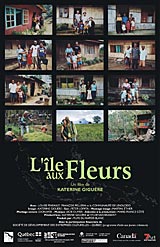
|

Seeds of Hope
(L’Ile aux fleurs)
Documentary by Katerine Giguère
Produced by Katerine Giguère and Sylvie Van Brabant
2005, 56 minutes
English Naration & Subtitles
At times, the “charity” concept of foreign aid often
createss dependencies and corruption that can do more to hinder
than to help. In The setting isSeeds of Hope, set on an Indonesian
island isle, in Indonesia where our two well- meaning protagonists
wonder what they have gotten themselves into. They quickly realize
that if they do not distance themselves from the local aid organizations,
that their projects — planting projects of medicinal herb
gardenss and creating jobs creation through eco-tourism —
will come to nothing. After months of language studies and fruitless
meetings, they find the village of Lekolodo. There, they and
embark on a journey with these familiesthe inhabitants that
will profoundly change them all and ultimately become an model
of example in autonomy cited by the Indonesian government. Seeds
of Hope is a touching example of tenacity in the face of petty
minded opposition.

• Audience Award and Prix Découverte (1st Film), Festival de Films
• de Portneuf sur l’Environnement, Saint-Casimir, Quebec, 2006
 |
| |
|
|
|
| |

015
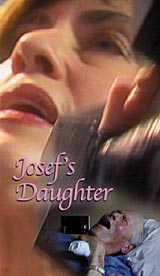
|

Josef's Daughter
Documentary by Ilana Linden
Produced by Sylvie Van Brabant
2005, 52 minutes
English
As she turns 50 Ilana’s father Josef is dying. The
picture of decay and death she witnesses intensifies the sensation
of her imminent decline. She decides to revitalize her life
via her body by following a rigorous body building program,
to make herself robust and resilient so that mid-life can lose
some of its terror and become a place of promise.
As she sheds the pounds and chisels a new body Ilana explores
with unabashed honesty: aging, mortality, youth, and beauty.
When Ilana’s father dies she finds herself mourning for
a man she hardly knew. The need to understand who her father
was takes her on a journey that reveals what has shaped her,
who she is, and what she is becoming.
Josef’s Daughter is a compelling meditation on mortality
and family dynamic, taking a visceral look at one woman’s
journey through the cycle of life.
 |
| |
|
|
|
| |

014
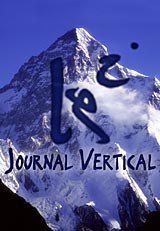 |

K2 Ascending Journal
(K2 Journal Vertical)

Documentary by Claude-André Nadon
Produced by Katerine Giguère and Sylvie Van Brabant
2004, 45 minutes
English Naration & Subtitles
In the summer of 2003, alpine climbers Claude-André
Nadon, Sylvain Geneau and Alfred Schreilechner attempted the
most difficult and dangerous mountain of this passionate sport,
This film is Claude-André’s journal, an intimate
dialogue between a man and a treacherous mountain exploring
the point of view of the climber from without and within as
he speaks to his camera, against a backdrop of spectacular
beauty and omnipresent danger. We witness the exhaustion,
but also the camaraderie as the climbers create a fragile
strand on vertical walls of stone.
In this film, Claude-André Nadon brings us to the top
of the world and gives us a privileged view of the true spirit
of mountaineering because the peak is not the end for all.

« What I learn
from a mountain is unique. For me, alpine climbing is a shortcut
to wisdom.»
- Claude-André Nadon

|
| |
|
|
|
| |

013
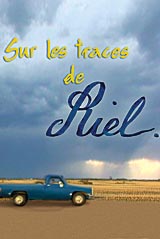
|

Sur les traces de Riel
Documentary by Sylvie Van Brabant
Produced by Nicole Hubert and Sylvie Van Brabant
2003, 52 minutes
English Subtitles
While on tour in Western Canada in the ‘90s, musician
and composer Normand Guilbeault discovered a chapter of history
he was unaware of: the tragic story of the Metis people and
their illustrious defender, Louis Riel. Inspired by the historical
research he conducted and motivated by a desire to restore
the reputation of this unsung hero, Guilbeault composed and
produced Riel, Plaidoyer musical / Musical Plea, a musico-poetic
work comprising 13 musicians and 2 narrators. The piece played
in Montreal and Halifax, and toured Western Canada in 2001.
But Guilbeault felt a need to dig deeper and to approach the
lives of the Metis for whom Riel was fighting more concretely.
A denigrated and outcast people, how do the Metis today regard
the hard defeats inflicted on them by History?
So, Normand Guilbeault set off on the path of Riel and the
descendants of the Metis. His guide was Rose Fleury, a 75-year-old
Metis with a passion for Riel and for finding a just reinterpretation
of her people’s history. Together, they meet with historians,
museum curators, contemporary Metis and descendants of Riel
who reexamine history daily.
Rose and Normand repeat Riel’s mythic journey from St.
Boniface, Manitoba, to Batoche, Saskatchewan. Their trip takes
them through landscapes of refined beauty verging on the sublime,
to people whose testimonials are, still today, filled with
the weighty controversy and tension generated by events of
over 125 years ago. Opposing views of the figure of Riel are
evoked. To some, he was a traitor and a madman; to others,
a hero, pacifist, and the true father of Manitoba. The political
and economical issues surrounding John A. Macdonald’s
beloved transcontinental railroad are also evoked. We learn
more about the conflict between hard-line Canadians devoted
to the British motherland and partisans of a just and prosperous
country for all - Natives, Metis and those of European stalk,
from all nations and languages. Seen through the filter of
the history of the Metis rebellion, the circumstances of the
founding of Canada can be seen in a different light.
Excerpts of Guilbeault’s performance, Riel, plaidoyer
musical / Musical Plea, punctuate and enliven this historical,
subjective road-movie in which the very principles of Riel’s
quest - justice, respect and courage - find a contemporary
echo that will inspire all those longing for more justice
in the world.

• Finalist Best
Documentary, Festival Présence Autochtone,
• Terre en vues, 2003

|
| |
|
|
|
| |

012
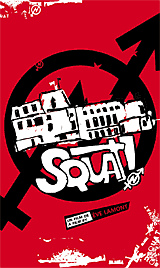
|

Squat!
Documentary by Ève Lamont
Produced by Nicole Hubert
2002, 82 minutes
English Subtitles
Montreal, summer 2001. During the city’s acute housing
crisis, young militants and people with poor lodging or none
at all barricaded and occupied a vacant building, voicing
their right to decent housing and a desire to live their own
way. Their cliché ridden portrayal in the media makes
them wary of the reporters sent to cover what is presented
as a mini siège. But they do trust filmmaker Ève Lamont,
and allow her to enter their lives, tell their story and present
their vision on what life should be. Their project was eventually
brutally dismantled, but their experiences in this film acclaimed
served to present a microcosm of the harsh effects of real
estate speculation and poor planning and indifference of government
agencies.

« Its
the biggest shock of this film: While we thought that the
« bums » were inside, we discover in
the end that they’ve been outside all along, in the guise
of unscrupulous politicians and brown nosed bureaucrats »
- Nathalie Petrowski, La Presse
• Best direction for a long form documentary, Hot Docs, 2003
• Humanitarian Prize Hot Docs, Toronto, Canada, 2003

|
| |
|
|
|
| |

011
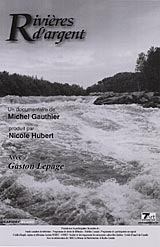 |

Rivières d'argent
A documentary by Michel Gauthier
Produced by Nicole Hubert
2002, 50 minutes
French
Between 1990 and 1994, the Quebec government accorded licences
to private companies to operate 57 small hydroelectric damns,
requiring the deviation of numerous Quebec rivers to produce
electricity. The decision was highly controversial and a moratorium
was declared. But in 2001, the moratorium was lifted and Quebec
announced a new program to issue private permits for the production
of electricity at specific sites. But this time, the population
took things into their own hands and decided to act. Citizens
formed collectives to protect their waterways, among the most
beautiful in the province.
Michel Gauthier espoused the cause. His documentary follows
several artist and citizen groups who led a crusade to force
the Québec government to abandon private hydro-electrical
production. Rivières d'argent is a thorough
inquiry on the environmental impact of these projects. The
film strives to understand as well as denounce. It provides
a tribune for local promoters convinced of project benefits
to the regional economy, as well as a platform for citizens
who question the energy requirements motivating such projects,
which they perceive as a threat to the development of a viable
recreational and tourist industry.
In 2001-2002, Rivières d'argent stimulated public
debate around the issue. The documentary was widely screened
and fuelled the work of citizens committees questioning the
pertinence of such government programs. The Adoptez une
rivière coalition, supported by fifty artist- spokespersons,
actually succeeded in blocking the dams. On November 26th,
2002, Quebec changed course, officially putting an end to
the program. But is the case really closed, or should we remain
vigilant? Today, director Michel Gauthier continues to screen
his film as part of the campaign for public awareness. This
topical issue arouses passionate debate and raises many questions.

« In
Rivières d’argent, private promoters expostulate,
citizens denounce, government attempts to minimize the issue,
artists symbolically adopt rivers, and environmental activists
raise their voices loud and clear. A lively and highly pertinent
debate. »
- Tommy Chouinard, Voir

|
| |
|
|
|
| |

010
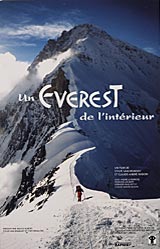
|

Everest from within
(Un Everest de l'intérieur)
Documentary by Sylvie Van Brabant and Claude-André Nadon
Produced by Nicole Hubert, Sylvie Van Brabant (Rapide-Blanc)
and Yves Bisaillon (National Film Board of Canada)
2001, 52 minutes
English Subtitles
In May 2000, four Canadians set off on an expedition to climb
the perilous north side of Mount Everest without the use of
oxygen or sherpas. The majestic Himalayas form the backdrop
for this documentary as the four try to conquer the mythical
top of the world. Anxiety, courage, friendship and rivalry :
the group’s ordeal gives us a rare insight into the human
condition under stress, and, while immobilised on the edge
of the mountain by extreme weather conditions, we can share,
as if we were there, the emotions and tensions that afflict
the group’s solidarity : threatening the dream of
attaining the summit itself. Do they possess what it takes
to succeed in such a hostile environment or is the journey
just one of coming to terms with their own limitations?
Whatever the outcome, the group managed to capture these breathtaking
images from the heavens, and deliver a moving testimony to
the fragility of humankind while confronted by the mighty
forces of nature.

« An
intimate Everest, a stunning document that reveals the intimacy
of those that lay their fate at the feet of the capricious
mother godess of the world »
- Richard Chartier, La Presse
• Grand prix documentaire du Festival d’Autrans, 2002
• Prix Galaxi de l’Association canadienne des télévisions
• par le câble, 2001
• Nomination for Best Music, Gémeaux for television

|
| |
|
|
|
| |

009
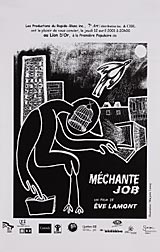
|

Méchante job
Documentary by Ève Lamont
Produced by Nicole Hubert
2001, 70 minutes
French
Globalisation and increasing competition on world markets
continue to cause massive layoffs and the deterioration of
working conditions. Today unemployment and an unstable work
environment affect a third of Quebec’s population.
Faced with a workplace in constant transformation, people
from various regions of Quebec are developing alternative
ways to live and participate in society, outside the norms
of the traditional job market.
The artists of the Cochon Souriant work as a collective
in their self-managed travelling theatre company. An almost
totally self-sufficient family lives in the country, far from
consumer society; mothers on welfare lobby for a citizenship
income; while a businessman prefers social action to commercial
enterprise. Each is redefining the true meaning of work in
his own manner by placing emphasis on the concepts of reciprocal
relationships, the informal exchange of good and services,
and by investing in cultural and social projects while struggling
collectively to better their existence. Such individuals seek
control over their own lives and schedules, and strive to
obtain meaningful results from the activities that occupy
their time, conditions that cannot be found in today’s
workplace. We discover a variety of experiences and activities
that make us reflect on the place work occupies in our lives
and our society.
 |
| |
|
|
|
| |

008
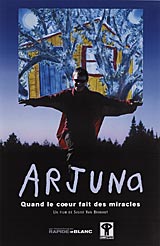
|

Arjuna
Documentary by Sylvie Van Brabant
Produced by Nicole Hubert (Rapide-Blanc)
and Yves Bisaillon (National Film Board of Canada)
2000, 52 minutes
French
Arjuna is a surprising young man. When he was born in 1974,
the doctors diagnosed him with Down’s syndrome, and told
his parents that it was unlikely he would live to be six or
seven. That was 25 years ago. Today, Arjuna is an artist with
a love for life that inhabits the rich colors of his paintings.
The flowers and mountains, the birds and lakes are a moving
praise to the things that make up his days.
He is also a hard working member of the Maison Emanuel, an
alternative therapeutic center north of Montreal where he
is responsible for gardening, tending of the animals and many
other chores.
In 1999 his paintings are selected for an international exhibition
of handicapped artists from 34 countries to be held in Los
Angeles. This special journey is the result of the many factors
that have made Arjuna’s life creative and productive;
the unflagging support of his family, the art therapist who
has worked so hard with him, and Arjuna’s limitless enthusiasm
and energy.
Arjuna bares his soul to all of us in this portrait. His life
has been far from easy, but his way of embracing life is simply
joyful. At the film’s premiere in Montreal the members
of an association of parents of children with Down’s
syndrome thanked filmmaker Sylvie Van Brabant for giving them
a much needed tool to broaden the general understanding of
this disorder, and show us how it is possible for these predominantly
joyful and responsible people to participate as active members.

• Prix Fernand-Séguin -
best production, Festival International
• de Multimédia et de la Vidéo Santé, 2000

|
| |
|
|
|
| |

007
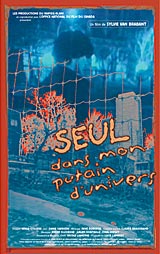
|

The Kids Next Door
(Seul dans mon putain d'univers)
Documentary by Sylvie Van Brabant
Produced by Lucie Lambert , Sylvie Van Brabant (Rapide-Blanc)
and Nicole Lamothe (National Film Board of Canada )
1997, 52 minutes
English Subtitles
(French version, 84 minutes)
They are four boys: Julien, Frédéric, Noé
and Michel. Each is alone, facing an uncertain future, after
years of being shuffled from one detention center to another.
They have stolen and fought, used, abused and dealt in drugs.
Each has a strong personality in his own right, wounded and
vulnerable, yet at times enlightened by flashes of lucidity.
In front of the camera, they want to open up and express their
thoughts about parents, absent or present, and the influences
that have shaped their earliest childhood. At the heart of
their reflections is their struggle with violence, substance
abuse, hopelessness, despair and exclusion. All are talented
and intelligent, but they have not turned out as well as we
could expect. Who’s to blame? Who can say?
Sylvie Van Brabant spent a complete year following these boys,
listening to their stories and accompanying them in their
efforts to make their way in the world and invent a future
for themselves. A year later, it is time to take stock. Not
about the general phenomenon of violence, its profound causes
and ramifications, but rather to attempt to assess the difficult,
Seul dans mon putain d'univers (meaning Alone in
my dammed world) is a brutal film that blends realism,
sensitivity and compassion in its scrutiny of the soul of
a generation whose despair, violence and drug abuse are symptomatic
of a deeper social malaise. Testimony by Julien, Frédéric,
Michel and Noé is heightened by the often virulent
or embittered comments of street kids encountered along the
way. The filmmaker’s intention was to give these young
people a chance to express themselves. Their words shake our
complacency and show us the extent of their desperation.

« Sylvie
Van Brabant succeeds in getting these boys to reveal themselves
in troubling moments of truth. Her film is not so much a cry
of despair, but a wake-up call for us all to understand who
these kids really are and to see ourselves as we are. »
- Serge Dussault, La Presse
• Prix Fernand Séguin, 1999
• Grand Jury Prize, Festival
international du multimédia
• et de la vidéo santé,
Montreal, Canada, 1999
• Nominee for best Quebec feature film at the Rendez-vous du
cinéma • • québécois, Montreal, Canada, 1998
• Nominee Chalmers Award for Best Canadian documentary

|
| |
|
|
|
| |

006
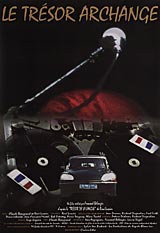
|

The French Spirit
(Le trésor archange)
Documentary by Fernand Bélanger
Produced by Sylvie Van Brabant
1996, 76 minutes
English Subtitles
The French Spirit is a musical documentary about the
French language in North America that takes us from the days
of the colonists right into the future. On board the « French
Spirit », an old Citroen, René Lussier and
Claude Beaugrand, armed with a Nagra and a rare love of their
language, travel the old “Chemin du Roy”, retracing
Charles De Gaules’ historical trip, in search of their
linguistic heritage and in the hope of finding the magic of
the old popular québécois folk tales.
This conceptual road movie incorporates the people they meet
and interview, and the historical voices that have shaped
their lives. Lussier takes this original verbal material,
mixes it with that of well known personalities such as singer
songwriter Richard Desjardins, the poet Patrice Desbiens,
Michel Chartrand, and translates it into a musical tale recounting
the history of the French language in North America. We are
treated to a collage of the folklore, political statements
and creative writing that has marked the culture of the people
they meet. Lussier’s music, inspired by the words, is
unique, haunting and mesmerizing; he creates a sonic world
that few are likely to forget.
Lussier’s work is close to filmmaker Fernand Bélanger’s
own historical and cultural concerns and his vision of the
linguistic situation in Québec.
The film is not only about the music, it is also about the
history of Quebec with all its massacres, war measures, and
its songs and tales of ordinary people.

« This
fascinating documentary, as much a road-movie as a “cinéma
vérité” piece, retraces with originality,
boldness and humor the story of the French language in North
America. »
- Marc-André Lussier, La Presse
• Honorable Mention, The Festival du Nouveau Cinéma,
• Montreal, Canada, 1996

|
| |
|
|
|
| |

005
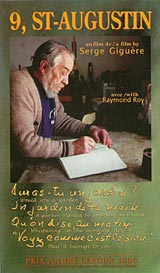
|

9, St-Augustin
Documentary by Serge Giguère
Produced by Sylvie Van Brabant (Rapide-Blanc)
and Nicole Lamothe (National Film Board of Canada)
1996, 52 minutes
English Subtitles
Raymond Roy is a 64-year-old idealist, an energetic social
activist ready to give everything he has to those living on
the edge: the alienated, impoverished and exploited members
of society. Raymond is also a priest, doing what he has wanted
to do ever since he was a teenager.
Filmmaker Serge Giguère paints an intimate portrait
of a man who has spent 30 years fighting for an alternative
vision of life in his community. The film is a blend of cinema
vérité and social history that provides a view
of the man and his work from without and within, from the
poetry of his personal diary laced with doubts and self-criticism,
to the many achievements of the community groups he helped
Filming over several years, Giguère gives us a sense
of the changes in values and attitudes of those who run our
society, along with the role of the community groups who provide
solutions, inspiration and a sense of renewal.
Giguère’s images reveal the imagination of a social
activist, a relentless Victoriaville legend who states, “For
me, the most powerful factor for change is anger, chronic
anger, the kind that gets under your skin and goes right to
the bone.”

“Giguère
returns to his beloved Victoriaville with this remarkable
examination of the spread of consumer culture, where everything
and everyone is disposable... Giguère’s careful
portrait of Roy is alternately angry and humorous, but always
inspiring.”
- David McIntosh, Hot Docs Focus On 2006
• Best medium-length film, Rendez-vous du cinéma québécois,
• Montreal, Canada,
l996
• AQCC award (Prix André-Leroux) for best medium length
• documentary, Montréal, Canada, l996
• Biography/History nominee, Hot Docs, Toronto, Canada, 1996
• Official competition, Visions du Réel, Nyon, Switzerland, l997

|
| |
|
|
|
| |

004
|

Baby Business
Documentary by Judy Jackson
Produced by Sylvie Van Brabant (Rapide-Blanc)
and Don Haig (National
Film Board of Canada)
1995, 59 minutes
English
Ideally, international adoption is a humanitarian solution
to the misery of childlessness in the North, and poverty in
the South. However, the number of people in the developed
world waiting to adopt outstrips the supply of legally abandoned
babies in the Third World. Middlemen are turning crossborder
adoption into a baby market. The combination of unscrupulous
lawers, corrupt officials and foreign couples desperate to
be parents all too often creates a situation in which children
become pawns in a ruthless game.
Baby Business is Judy Jackson’s journey through the international
adoption maze. In El Salvador, anguished women are still trying
to locate children snatched by soldiers during the brutal
repression of the ‘80s; many of these children later
ended up adopted abroad. In Mexico, parents lobby the government,
convinced their lost children have been stolen for foreign
adoption. In Guatemala, Jackson uncovers a system of illegal
nurseries, called “casas de engorde” or fattening
houses.
These scenarios reproduce themselves in many countries of
the world today. But it doesn’t have to be this way.
On a more hopeful note, the film documents a Haitian adoption
program which eliminates the intrusion of entrepreneurial
middlemen and is run with integrity and genuine accountability.
Baby Business is a plea – particularly to prospective
parents and adoption agencies in developed countries –
to fully understand the complicated process of international
adoption.

• Gold Apple
Award, National Educational Media,
• Oakland, California, 1996
• Certificate for Creative Excellence, International Film
• and Video Festival, Illinois, 1996
• Finalist Award, New York Festival, 1996
• Gold Cindy, International Cindy Competition,
• Spring Valley, California, 1997

|
| |
|
|
|
| |

003
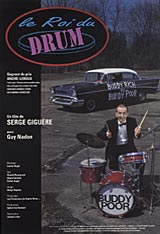
|

King of Drums
(Le roi du drum)
Documentary by Serge Giguère
Produced by Sylvie Van Brabant
1992, 54 minutes
English Subtitles
He’s been called the best drummer in Canada, the embodiment
of Quebec jazz; he’s been compared to Buddy Rich, hailed
as the Woody Allen of drums, and nicknamed the “Drummer
King”. Guy Nadon is indeed all these things, but most
of all he is a great musician, an outstanding composer and
arranger. Edited in a staccato style matching the rhythm of
Nadon’s music, this documentary introduces us to a fascinating
and endearing personality passionately beating out tempos
on the empty tins that were the only “instruments”
his family could afford.
We fallow his career from the tough times to the glory days
and listen in on some first-hand accounts of memorable jam
sessions with other jazz greats. And in the end, we are totally
spellbound by this man whose lifeblood pulses to the rhythm
of his music.

« Creative
genius can be found in the most unexpected places, as Giguère
reveals in his high-energy portrait of East Montreal jazz
drummer Guy Nadon... But as surreally engaging as Ti-Guy is,
with renditions of his own rapid fire compositions such as
“Scotch Tape” and “Inflation,” he is also
a tragic figure, trapped by his own past and fears. »
- David McIntosh, Hot Docs Focus On, 2006.
« Giguère presents Nadon in a series of
historical reconstructions, which give this fast-paced documentary
its popular flavor – like a percussion solo in the manner
of Ti-Guy Nadon. This popular, totally unpretentious drummer
who says anything that comes into his head, literally bursts
through the screen and out of Giguère’s film frames. »
- Pierre Demers, Factuel
• Best documentary one hour, Rendez-vous du cinéma québécois,
• Montreal, Canada, l992
• Gémeaux award for television - Best research

|
| |
|
|
|
| |

002
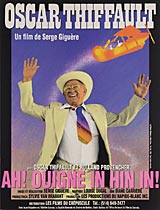
|

Oscar Thiffault
Documentary by Serge Giguère
Produced by Sylvie Van Brabant
1988, 56 minutes
English Subtitles
This humorous portrait of the whimsical Oscar Thiffault established
Serge Giguère as a unique voice in Quebecois documentaries.
Oscar is 75 years old, an almost forgotten legend with a life
that tells the story of his people, their poverty and aspirations,
and their love of a good time.
His music is a cross between traditional and country. The
lyrics of his most famous tune Le Rapide-Blanc are
innocently scandalous; a sing along tale about lumberjacks
who are forced to leave their wives and girlfriends behind,
preys to temptation and the seductive words of the stranger
who comes a knocking.
Giguère’s camera follows Oscar’s humble trailer
as he retraces the steps of his life, and lives out his fantasies
of flying in the toy airplanes he concocts in his workshop.
Oscar Thiffault is an ingenious blend of live and archival
footage that spans thirty years of history from the perspective
of a working man who went from factories to fame and back
again, savoring life every step of the way.

« From the
Rocket Richard riots and the Sputnik launch to the arrival
of parking meters and the banning of prostitution in Montreal
by mayor Drapeau, Thiffault transformed everyday experiences
into hilarious, toe-tapping, risqué social commentary. »
- David McIntosh, Hot Docs 2006
« The power of Serge Giguère’s film
is that he is able to show us the in-depth personality of
his incredible character, a relentless singer whose lyrics
are a humorous chronicle of the last 40 years of Quebec history. »
- Michel Coulombe, Le Devoir
• Best documentary one hour, Rendez-vous du cinéma québécois,
• Montreal,
Canada, 1988
• Honorable mention, Banff Festival, Banff, Canada, 1988
• Best movie on a Canadian Character and Best Editing,
• Golden
Sheaf Award, Yorkton, 1988

|
| |
|
|
|
| |

001
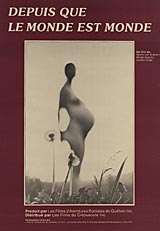
|

Depuis que le monde est monde
Documentary by Sylvie Van Brabant,
Serge Giguère and Louise Dugal
Produced by Sylvie Van Brabant
1981, 64 minutes
French
The birth of a child is a basic expression of life in its totality.
It constitutes the renewed awareness of the essence of what
men and women are, in the respectful, dignified context of founding
a family. While expecting their first child, Sylvie Van Brabant and Serge Giguère looked for a welcoming place to give
birth. The place and the choice of the people they wished to
be present at the birth motivated them to question the conditions
for childbirth in Québec. For Sylvie, maternity was a
privileged moment to re-appropriate her own body and to validate
her personal knowledge and abilities. Serge supported her in
this approach, and together they decided to make a film dealing
Depuis que le monde est monde is a hard-hitting documentary
that allows us to accompany three couples during the birth of
their child. In doing so, they help illustrate the analysis
and propose viable alternatives to the medical intervention
model that dominates the hospital milieu. As a demonstration
of usual hospital practices in Québec, Luce and Marcel
give birth with an obstetrician at Sainte-Justine Hospital.
Linda and René choose to give birth illegally at home,
accompanied by two midwives. And Francine and Jean, a couple
from Beauce, fight for the right to have a birthing room at
the Beauceville hospital, in order to prove that it is possible
to give birth according to one’s convictions in a hospital
environment.
Thanks to the media attention it attracted, Depuis que le
monde est monde helped to revise thinking about birthing
practices in Québec in the 1980s. As an outcome of this
reflection, a movement of parents, health professionals and
midwives organised a series of conferences, entitled Accoucher
ou se faire accoucher, with the aim of providing recommendations
to the provincial government on the issue. After 25 years, the
debate is still going strong. In 2006, women obtained the right
to home birth, with a midwife.
 |
| |
|
|
|
|

